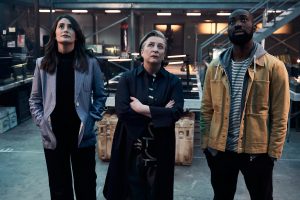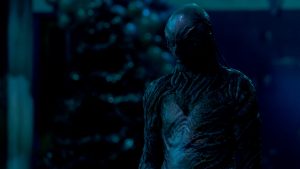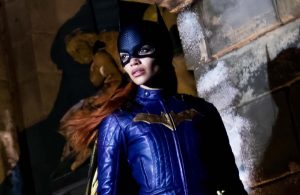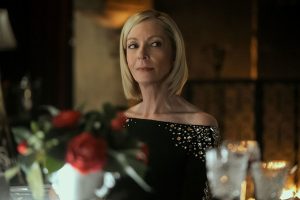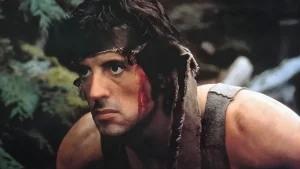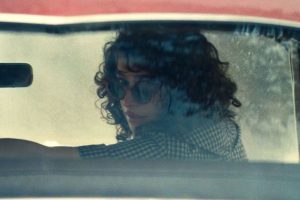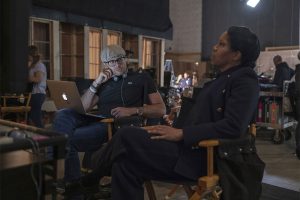
Warning: contains spoilers for Ghosts series five, episode five “Carpe Diem”.
It couldn’t be a joke. That was one rule laid down by the Ghosts creators when it came to choosing a first name for Willbond’s character. Until series five, the WWII ghost had been known only as The Captain – a mystery seized upon by fans of the show.
“It was the question we got asked more than anything. His name,” actor and writer Larry Rickard tells Den of Geek. “Once we got to series three, you could see that we were deliberately cutting away and deliberately avoiding it. We were fuelling the fire because we knew at some point we’d tell them.”
In “Carpe Diem”, the episode written by Rickard and Ben Willbond that finally reveals The Captain’s death story, they did tell us. After years of guessing, clue-spotting and debate, Ghosts revealed that The Captain’s first name is James. At the same time, we also learned that James’ colleague Lieutenant Havers’ first name was Anthony.
The ordinariness of those two names, says Rickard, is the point.
“It Shouldn’t Be Cormoran or Endeavour”
“The only thing we were really clear about is that we didn’t want one of those names that only exists in tellyland. It shouldn’t be ‘Cormoran’ or ‘Endeavour’. They should just be some men’s names and they’re important to them. The point was that they were everyday.”
Choosing first names for The Captain and Havers was a long process not unlike naming a baby, Rickard agrees. “It almost comes down to looking at the faces of the characters and saying, what’s right?”
“We talked for ages. For a long time I kept thinking ‘Duncan and James’, and then I was like ah no! That would have turned it into a gag and been awful!” Inescapably in the minds of a certain generation, Duncan James is a member of noughties boyband Blue. “Maybe with Anthony I was thinking of Anthony Costa!” Rickard says in mock horror, referencing another member of the band.
Lieutenant Havers wasn’t just The Captain’s second in command while stationed at Button House; he was also the man James loved. Because homosexuality was criminalised in England during James’ lifetime, he was forced to hide his feelings for Anthony from society, and to some extent even from himself.
“The Passing of the Baton”
In “Carpe Diem”, the ghosts (mistakenly) prepare for the last day of their afterlives, prompting The Captain to finally tell his story. Though not explicit about his sexual identity, the others understand and accept what he tells them – and led by Lady Button, all agree that he’s a brave man.
Getting the balance right of what The Captain does and doesn’t say was key to the episode. “It wasn’t just a personal choice of his to go ‘I’m going to remain in the closet’,” explains Rickard. “There wasn’t an option there to explore the things that either of them felt. That couldn’t be done back then – there are so many stories which have come out since the War about the dangers of doing that.
“We wanted to tell his personal story but also try to ensure that there was a level at which you understood why they couldn’t be open, that even in this moment where he’s finally telling the other ghosts his story, he never comes out and says it overtly because that would be too much for him as a character from that time.
“He says enough for them to know, and enough for him to feel unburdened but it’s in the fact that they’re using their first names which militarily they would never have done, and in the literal passing of the baton”.
The baton is a bonus reveal when fans learned that The Captain’s military stick wasn’t a memento of his career, but of Havers. As James suffers a fatal heart attack during a VE day celebration at Button House, Anthony rushes to his side and the stick passes from one to the other as they share a moment of tragic understanding.
“From really early on, we had the idea that anything you’re holding [when you die] stays with you. So it wasn’t just your clothes you were wearing, we had the stuff with Thomas’ letter reappearing in his pocket and so on. And the assumption being that it was something The Captain couldn’t put down, it felt so nice to be able to say it was something he didn’t want to put down.”
“Good Old James”
Rickard lists “Carpe Diem”, co-written with Ben Willbond, among his series five highlights. He’s pleased with the end result, praises Willbond’s performance, and loved being on set to see Button House dressed for the 1940s. He’s particularly pleased that a checklist of moments they wanted to land with the audience all managed to be included. “Normally something’s fallen by the wayside just because of the way TV’s made, it’s always imperfect or it’s slightly rushed, but it feels like it’s all there.”
Rickard and Willbond also knew by this point in the show’s lifetime, that they could trust Ghosts fans to pick up on small details. “Nothing is missed,” he says. “Early on, you’re always thinking, is that going to get across? But once we got to series five, there are little tiny things within corners of shots and you know that’s going to be spotted. Particularly in that very short exchange between Havers and the Captain. We worried less about the minutiae of it because you go, that’s going to be rewound and rewatched, nothing will be missed.”
The team were also grateful they’d resisted the temptation to tell The Captain’s story sooner. “We’d talked about it every series since series two, whether or not now was the time, but because he’s such a hard and starchy character in a lot of ways you needed the time to understand his softer side I think before you had that final honest beat from him.”
“What a ridiculously normal name to have so much weight put on it for five years,” laughs Rickard fondly. “Good old James.”
Ghosts series five is available to stream now on BBC iPlayer.
The post Ghosts’ Larry Rickard Explains Why They Chose the Captain’s First Name appeared first on Den of Geek.

